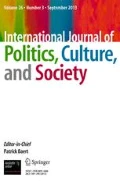Abstract
In many former Eastern Bloc countries, economic transition has been responsible for drastic declines the social and economic well-being for both men and women. In general, however, women have tended to experience relatively greater losses since 1989. Through a detailed case study of women's employment in the tourism sector of post-Communist Bulgaria, this chapter will argue that state support for certain economic sectors can help improve the relative economic welfare of women. Using both qualitative and quantitative data, this study finds that state support for viable economic sectors with relatively high wages that employ a “critical mass” of women can help to ease the difficult transition from centrally-planned to free-market economies.
Similar content being viewed by others
REFERENCES
Alsanbeigui, N.; Pressman, S.; & Summerfield, G. (1994) Women in the Age of Economic Transformation: Gender Impacts of Reforms in Post-Socialist and Developing Countries, New York: Routledge.
Buckley, M. (1997) Post-Soviet Women: from the Baltic to Central Asia Cambridge, New York: Cambridge University Press.
Bulgarian Foreign Investment Agency (2000) Bulgaria Business Guide 2000: Legal, Tax and Accounting Aspects, Sofia: BFIA.
Bulgarian Telegraph Agency (2000) Press Release, 14 July 2000.
Cukier-Snow, J. & Wall, G. (1993) “Tourism Employment: Perspectives from Bali,” Tourism Management, 14: 195–201.
Cukier-Snow, J. & Wall, G. (1994) “Tourism Employment in Bali, Indonesia,” Tourism Recreation Research, 19: 32–40.
Dakova, V. and Indeshewa, R. (1999) Bulgaria Report, Transition: Gains and Losses, Montevideo: Instituto del Tercer Mundo.
Doitshev, P. (1999) Zhivot, Otdaden na Turisma, Sofia: Literaturen Forum.
Einhorn, B. (1993) Cinderella Goes to Market: Citizenship, Gender, and Women's Movements in East Central Europe, London & New York: Verso.
European Union (1996) The Bulgarian Tourism Industry and the Bulgarian Tourism Market, Athens: Planet S.A.
European Union (1997) Human Resource Development Strategy for the Tourism Industry, Madrid: Consultiberica S.A.
European Union (1998) Tourism: Institutional Strengthening in Bulgaria, Athens: Planet S.A.
Foreign Investment Advisory Service (1999) Bulgaria: Administrative Barriers to Investment, Washington, D.C.: World Bank.
Funk, N. and Mueller, M. (1993) Gender Politics and Post-Communism: Reflections from Eastern Europe and the Former Soviet Union, New York: Routledge.
Giddings, L. (2000) Does the Shift to Markets Impose Greater Hardship on Women and Minorities? Three Essays on Gender and Ethnicity in Bulgarian Labor Markets, unpublished Ph.D. dissertation, American University.
Harrison, D. (1993) “Bulgarian Tourism: A State of Uncertainty,” Annals of Tourism Research, 20: 519–34.
McKinnon, R. (1993) The Order of Economic Liberalization: Financial Control in the Transition to a Market Economy, Baltimore & London: Johns Hopkins University Press.
Moghadam, V. (1996) Patriarchy and Economic Development: Women's Positions at the End of the Twentieth Century, New York: Clarendon Press.
Musiolek, B. (1997) (Ed.) Ich Bin Schick und du Musst Shuften: Frauenarbeit fur den Globalen Modenmarkt, Frankfurt: a. M.
National Statistical Institute (1994) Integrated Statistics on Women, Women in Bulgaria and the World. Sofia: NSI.
Republic of Bulgaria (2000) National Economic Development Plan 2000–2006, Sofia.
State Gazette (1997) Law on the Transformation and Privatization of State and Municipal Enterprises, Art. 25, para. 3–4, no. 89: 7 October 1997.
UNDP (United Nations Development Program) (1998) “Gender Empowerment Measure,” New York: UNDP. Available online at www.undp.org/hdro/98gem.htm.
UNDP (1999) National Human Development Report Bulgaria 1999, Sofia: UNDP.
World Bank (2000) Economic Report: Bulgaria, Sofia: World Bank.
Women's Alliance for Development (2000) “Women in Bulgaria 2000,” WAD website at www.geocities.com/woalde.
Author information
Authors and Affiliations
Rights and permissions
About this article
Cite this article
Ghodsee, K. State Support in the Market: Women and Tourism Employment in Post-Socialist Bulgaria. International Journal of Politics, Culture, and Society 16, 465–482 (2003). https://doi.org/10.1023/A:1022364630327
Issue Date:
DOI: https://doi.org/10.1023/A:1022364630327



